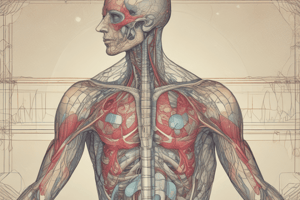Podcast
Questions and Answers
What is the primary focus of physiology?
What is the primary focus of physiology?
- Investigating the relationship between social inequalities and biology
- Studying the structure, function, and regulation of organ systems (correct)
- Exploring the origins of species
- Analyzing the impact of economic inequality on human health
Which term is used to describe the cumulative physiological stressors our bodies face due to external factors like economic inequality?
Which term is used to describe the cumulative physiological stressors our bodies face due to external factors like economic inequality?
- Fossil record
- Natural selection
- Evolutionary theory
- Allostatic load (correct)
What does the study by McEwen, et al. (2018) emphasize regarding human biology?
What does the study by McEwen, et al. (2018) emphasize regarding human biology?
- The relationship between social interactions and cellular functions
- The genetic origins of species
- The evolution of organisms in response to environmental changes
- The physiological connections between economic inequality and health (correct)
Which field offers knowledge about the change in organisms and their descendants over time?
Which field offers knowledge about the change in organisms and their descendants over time?
What is the significance of studying physiology according to the text?
What is the significance of studying physiology according to the text?
How does the text describe the role of physiology in addressing 21st-century challenges?
How does the text describe the role of physiology in addressing 21st-century challenges?
What challenges can physiology help address based on the text?
What challenges can physiology help address based on the text?
Why is diversifying the scientific community considered paramount according to the text?
Why is diversifying the scientific community considered paramount according to the text?
How does physiology contribute to our understanding of human health and disease?
How does physiology contribute to our understanding of human health and disease?
What does studying physiology offer, according to the text?
What does studying physiology offer, according to the text?
Study Notes
Exploring Physiology: The Intricate Links Between Biology and Well-being
Physiology, a crucial subdiscipline of biology, revolves around the study of the structure, function, and regulation of organ systems within living organisms. This multidimensional field offers an in-depth understanding of life at the cellular, molecular, and organismal levels. In this article, we'll dive into several intriguing aspects of physiology and its applications.
The Biology of Inequality
Research has demonstrated a close relationship between social and economic inequalities and their effects on human health and biology. A study by McEwen, et al. (2018) emphasizes the physiological connections between external factors like economic inequality and our body's response to these challenges. The concept of allostatic load, which refers to the cumulative physiological stressors our bodies face, underscores the importance of understanding how poverty and inequality affect our biology.
Evolution
Evolution, a central tenet of biology, is the process that explains the change in organisms and their descendants over time. The concept is embedded in the theory of natural selection, which favors the survival and reproduction of organisms better suited to their environment. From the fossil record to genetic research, evolutionary theory offers a wealth of knowledge about the origins of species and their adaptations.
Beyond Disparities in Research
Income inequality is not limited to the world of science but is also evident in the scientific community itself. Recent studies have shown that researchers from lower-income backgrounds are underrepresented in science, and the path to a career in science is often not as easy for them as it is for those from more affluent families. Consequently, efforts to diversify the scientific community and address the financial barriers to scientific careers are paramount.
The Cell's Rich History
The cell, initially discovered by Robert Hooke in 1665, has a rich and fascinating history that has shaped modern biology. From the discovery of the cell to the microscopic study of cells, our understanding of cellular structure and function has grown dramatically. The history of cellular research offers a wealth of knowledge and an appreciation of how science has evolved over time.
Biology and Physiology: Together for a Healthier Future
Biology, physiology, and related fields contribute to our understanding of human health and disease. By delving into the complex mechanisms of the human body, we can better comprehend the physiological response to various stressors and develop interventions to promote well-being. A rich interdisciplinary collaboration among biologists, physiologists, and other experts is essential for addressing the challenges of the 21st century.
In conclusion, physiology is a critical subdiscipline of biology that offers an in-depth understanding of the human body's structure, function, and regulation. By studying physiology, we can learn about the complex interactions between our environment, health, and well-being. This knowledge offers valuable insights into the physiological effects of social and economic inequality and provides a foundation for developing interventions to promote healthier lives.
Studying That Suits You
Use AI to generate personalized quizzes and flashcards to suit your learning preferences.
Description
Discover the intricate links between biology and well-being through the study of physiology. Explore the relationship between social inequalities, evolution, cellular history, and the importance of diversity in the scientific community. Gain insights into how biology and physiology contribute to understanding human health and developing interventions for a healthier future.




